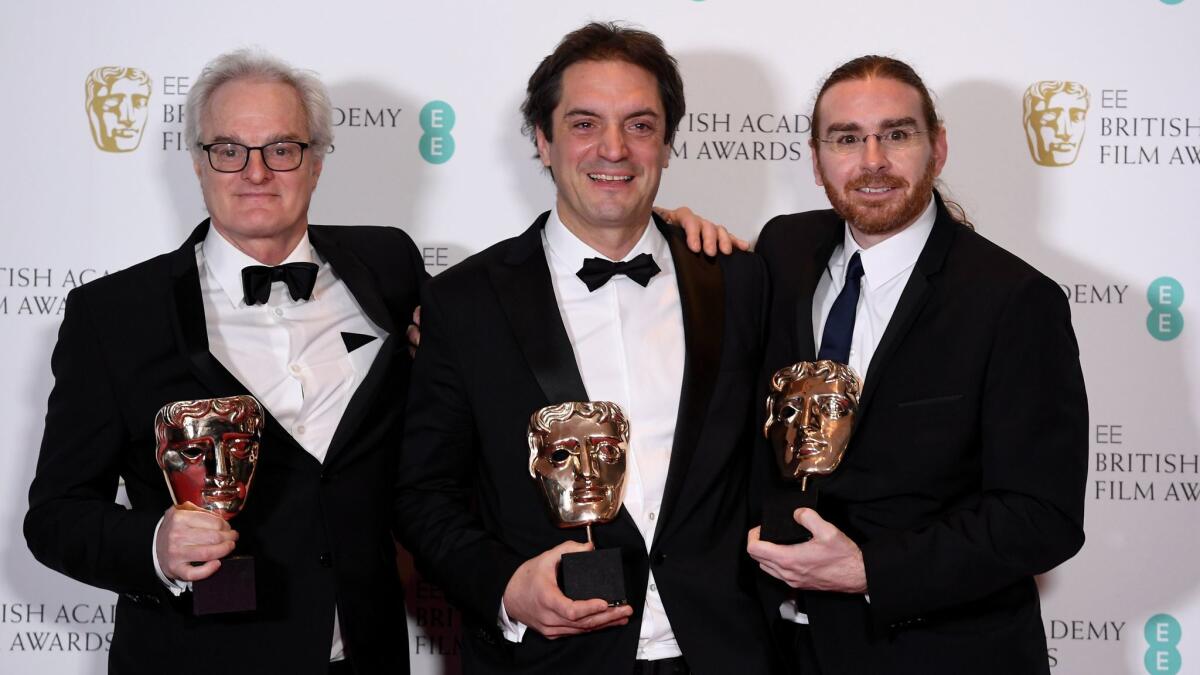Meet the Oscar-nominated sound editor who helped ‘Arrival’ sound like no other alien movie
- Share via
In a typical sci-fi movie about extraterrestrials, there are certain kinds of sounds you’d expect to hear: electronic bleeps and bloops, whooshing spaceships, the slithering of slimy aliens, some pew-pew-pew laser blasts.
But as anyone who’s seen it will tell you, “Arrival” is not a typical sci-fi movie about extraterrestrials.
To help create a unique aural feel for the film — the story of a linguistics professor (Amy Adams) who is recruited by the military to help communicate with mysterious alien visitors — director Denis Villeneuve turned to a longtime friend and frequent collaborator, sound editor Sylvain Bellemare. The atmospheric, emotionally stirring soundscape Bellemare crafted has now earned him his first Oscar nomination.
A native of Montreal, Canada, the 49-year-old Bellemare had never worked on a big science-fiction film before, nor had he been part of a Hollywood studio production. But he’d certainly seen enough movies about aliens to know how easy it would be to slip into tired clichés.
“So many films have been done and so many people have brought their ideas over the decades, so it’s tough to imagine that you can do something different,” Bellemare said by phone from Montreal on a recent morning. “But at least you can believe you can.”
Villeneuve had a specific mandate for the kind of sound palette he wanted for “Arrival.”
“The simple approach was that all the sounds in the film needed to come from really natural, organic sources, instead of going to electronic or processed sound,” Bellemare said.
To create the voices of the aliens, known as heptapods, sound designers Dave Whitehead and Michelle Child blended various sounds including birds, camels, pigs and a Maori flute. The sound of the egg-shaped heptapod spacecraft as it moved through the sky was made by manipulating recordings of shifting rocks and ice.
I think cinema and dreams are really linked.
— Sylvain Bellemare, sound editor

In emotional terms, Bellemare said, the goal was to create “a moody vibe.”
“Amy Adams’ character, Louise, is sort of in a different mood and time zone,” he explained. “She’s never completely comfortable and she’s often dreaming and going into her flashbacks. So we tried to create sound that could refer to a mood for Louise.”
That blending of cinema and a sense of dreaminess was what first attracted Bellemare to a career in sound from an early age.
“I was born in 1968 and the films of the 1960s sometimes had sort of abstract sound design that I was really touched by early in my life,” he said. “When I was 6 or 7 years old, Sergio Leone films were playing on TV and I really discovered something there, a mood created between sound effects and music. I think cinema and dreams are really linked.”
When he coming up in the field, he learned a lot from watching the work of professionals he admired on the set and on the screen. “My mentors were the directors, some of whom I did films with, like Stéphane Lafleur, Bertrand Bonello, Denis Villeneuve, André Turpin, and others who unconsciously mentored me, like Andrei Tarkovsky, Jean-Luc Godard, Gus Van Sant and many others.”
Asked whether there is one particular trick of the trade he’s picked up over the years, he said yes: “That there is no good sound or bad sound — there is just the sound that fits your image, your story.”
When the Oscar nominations were announced early on the morning of Jan. 24, Bellemare was watching a livestream with “Arrival” collaborators Bernard Gariépy Strobl — who is nominated for sound mixing for the film along with Claude La Haye — and sound designer Olivier Calvert, waiting to hear if the film had made the cut. In the end, “Arrival” earned eight nominations, including best picture.
Within moments, another sound could be heard: the popping of a cork.
“We were drinking glasses of Champagne at 8:30 in the morning,” Bellemare recalled with a laugh. “It was thrilling.”
Twitter: @joshrottenberg
ALSO
The ‘big three’ Oscar directors talk about their movies and their awards season journeys
‘La La Land’ sound mixer Ai-ling Lee makes Oscar history with an ‘invisible’ art . . . and car horns
How ‘The Jungle Book’ VFX team re-created a classic through cutting-edge technology











